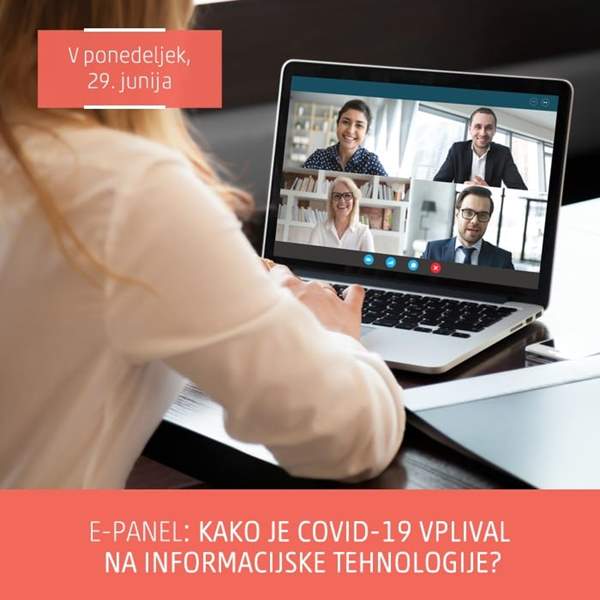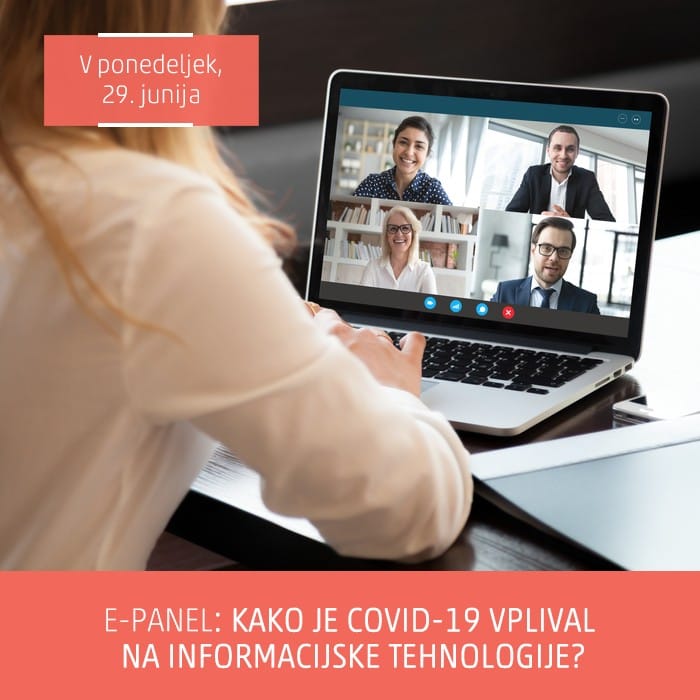
E - panel: How did COVID influence information technologies?

“During COVID-19, we were forced to digitize a certain part of life. This showed the important role of modern technologies and information technology knowledge, and thus increased the need for digital transformation and experts in this field. The panel will present the advantages and disadvantages of digital technologies revealed by the COVID19 crisis, what needs to be done, what needs to be improved, what are the new opportunities and realities in the field of technologies, explains dr. Matej Mertik, Study dean of the Web and Information Technology Program.
The panel took place on Monday, 29 June 2020.
Panelists included professors and experienced entrepreneurs from Slovenia and the USA:
- 𝐃𝐫. 𝐀𝐥𝐞𝐤𝐬 𝐉𝐚𝐤𝐮𝐥𝐢𝐧 - Sledilnik.org, https://1o.io
- 𝐃𝐫. 𝐀𝐧𝐝𝐫𝐞𝐣 𝐆𝐫𝐞𝐛𝐞𝐧𝐜, area of innovation "raise, stagnation and fall" and technological transitions,
- 𝐃𝐫. 𝐃𝐮š𝐚𝐧 𝐂𝐚𝐟, Forum for digital society (https://fdd.si)
- 𝐀𝐧𝐝𝐫𝐞𝐣 𝐊𝐨𝐬𝐢𝐭𝐞𝐫 and 𝐝𝐫. 𝐏𝐞𝐭𝐞𝐫 𝐌𝐞𝐫𝐜, Agenda d.o.o, Lemur Legal d.o.o, Blokchain thinkthank Slovenia
Presenter: 𝐝𝐫. 𝐌𝐚𝐭𝐞𝐣 𝐌𝐞𝐫𝐭𝐢𝐤, Study dean Web and information technologies, AMEU-ECM
*********************************
PRESENTATION OF PARTICIPANTS:
Mr. Aleks Jakulin, PhD, is the co-author of standards used by more than two billion people, as well as NASA vehicles on Mars. He was in charge of designing and implementing the course on data science at Columbia University in New York, his doctoral dissertation won the ECCAI Award for Best Doctoral Dissertation in Europe. Mr. Jakulin successfully founded, managed and sold a company that dealt with verbal communication and today runs company 1o with partners based in New York, whose goal is the modular integration of companies in e-commerce. Aleks is also one of the volunteers and initiators of Sledilnik.org, which works in the field of data excellence and linking data, models, companies and organizations in the presentation of the COVID epidemic in Slovenia.
Mr. Andrej Grebenc, PhD, is a former consultant to the European Commission and today a researcher at the American Sacred Heart University in Fairfield, Connecticut. He holds a PhD in innovation or models of “raise, stagnation and fall of technology transitions” and deals with talent and innovation.
Mr. Dušan Caf, PhD, is a former President of the Council of the Agency for Communication Networks and Services and the Council for Electronic Communications of the Republic of Slovenia (2011–2016). He comes from the business background, and is active in the regulation of electronic communications, cyber security, universal accessibility and digital policies. He is a consultant to the International Telecommunication Union, a specialized agency of the United Nations, and manager of regional projects. He is the coordinator of the Slovenian Forum on Internet Governance and the initiator of the establishment of a forum for the digital society, which, among other things, promotes access to the Internet and the digital society in Slovenia. Within the DIGITAS Institute, which he runs, he has participated in several international projects, in particular in the field of digital policies and Internet governance. He has been active in international efforts to maintain the neutrality of the Internet, which is the basis for the web as we know it. Today, he connects organizations in the region in ensuring availability of information and communication technologies.
Mr. Andrej Kositer, M.Sc., is one of the leading experts and entrepreneurs dealing with open source technologies and the Internet in Slovenia, with more than 25 years of experience, both in managing the company Agenda d.o.o. and in developing web solutions on open source technologies, as well as active participation in international associations and communities
and
Mr. Peter Merc, PhD, is a lawyer, focusing on the field of technology with a master's degree and a doctorate in banking / finance law. His area of expertise covers legal issues on how new technologies such as artificial intelligence, blockchain and big data should be regulated in a way not to hinder further development of technologies on the one hand and providing adequate protection for all stakeholders on the other. He has published more than 40 papers in various legal and financial publications where he deals with the topics of innovation in terms of technological and business models in accordance with the existing legal framework.
